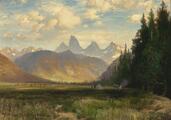

Lower Falls, Yellowstone Park / Thomas Moran
Essay/Description
“Mr. Moran is on his way to Yellowstone National Park. He will be accompanied by W. H. Jackson of this city and the world’s fair commissioners for Wyoming, the object of the trip being to secure materials for a large picture to be exhibited at the fair.”1 —Rocky Mountain News (Denver, CO), June 18, 1892
Thomas Moran first visited Yellowstone in 1871 as a guest of geologist Ferdinand V. Hayden, whose reports on the region helped convince Congress to establish the area as the first U.S. national park in 1872. Moran’s depictions of the region, such as his 1872 painting The Grand Canyon of the Yellowstone, helped to establish his career. The United States Congress purchased the 1872 portrayal of the Yellowstone canyon for $10,000.2
Moran visited the Yellowstone region for the second time, more than twenty years later, in 1892.3 The trip resulted in several field sketches, such as Stream from Faithful (13.1016), as well as a few significant oil paintings, including this work Lower Falls, Yellowstone Park, which Moran kept for the remainder of his life, perhaps as a memento of the larger painting upon which it is based.4 This painting is a smaller version of Moran’s The Grand Canyon of the Yellowstone (1893 and 1901),5 which he exhibited at the World’s Columbian Exposition in Chicago in 1893.6 According to Moran’s biographer, Thurman Wilkins, the painting proved popular with the public, although the artist could not find a buyer. The art market was changing, and collectors were no longer interested in large paintings depicting the American West.7
When the world’s fair ended, Moran loaned The Grand Canyon of the Yellowstone to the Smithsonian Museum of Art, and the painting was on display there until Moran’s death in 1926. Fortunately, conservationist and philanthropist George Dupont Pratt believed the work should be on view permanently at the museum. He negotiated with Moran’s daughter Ruth to purchase the work and then donated the painting to the Smithsonian, where it remains today.8
—Sandra Pauly, Henry Luce Foundation Curatorial Scholar for Moran Collection Research, 2021
_____________________________
1 “A Mountain Painter,” Rocky Mountain News (Denver, CO), June 18, 1892, quoted in Anderson et al., Thomas Moran, 126, 370fn32.
2 Anderson et al., Thomas Moran, 54. The painting is in the Smithsonian American Art Museum, lent by the Department of the Interior Museum, L.1968.84.1.
3 Morand, “Return to Yellowstone,” 19.
4 Morand, “Return to Yellowstone,” 20, 21–22, 26. The Gilcrease collection includes another oil painting created after the 1892 trip to Yellowstone, Great Hot Springs, Yellowstone Park (01.2342).
5 Morand, “Return to Yellowstone,” 22, 25–26. Lower Falls, Yellowstone Park measures 29 3/4 by 39 1/2 inches. The 1893 The Grand Canyon of the Yellowstone (Smithsonian American Art Museum, 1928.7.1) measures 96 1/2 by 168 3/8 inches. Moran reworked the 1893 painting in 1901.
6 Viewed at the time as a celebration of the four hundredth anniversary of Christopher Columbus’s landfall in the Americas, the World’s Columbian Exposition attracted twenty million visitors. Within the history of international world’s fairs, the Chicago event marked the beginning of the ascendancy of the United States on the global stage, and for art historians this was true of American art as well. For more on this world’s fair and its art exhibition, see Carr, Revisiting the White City.
7 Wilkins, Thomas Moran: Artist of the Mountains, 278. According to art historian Nancy K. Anderson, the painting attracted little to no attention from the critics. Moreover, Moran was well aware of the changes in the art market. Anderson et al., Thomas Moran, 127.
8 Wilkins, Thomas Moran: Artist of the Mountains, 279..



